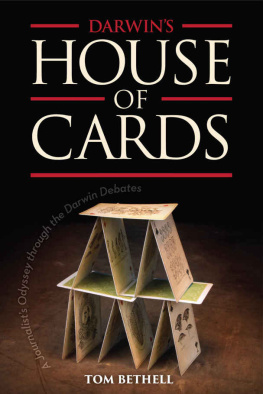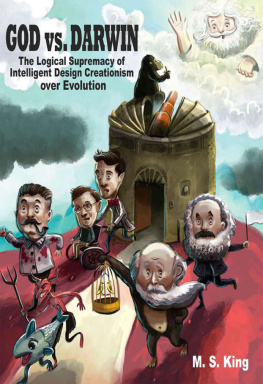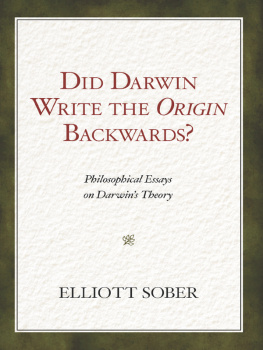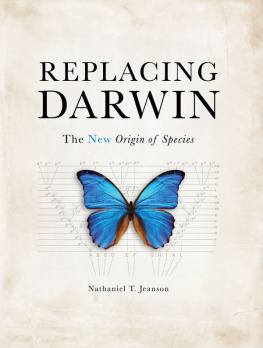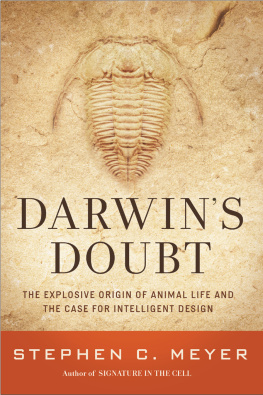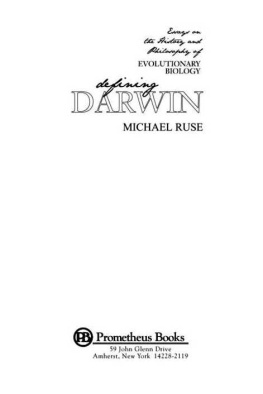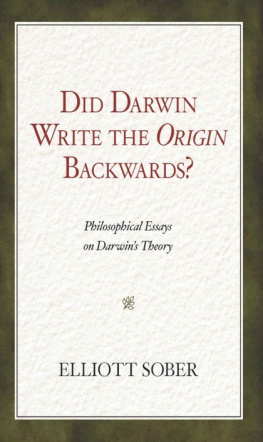DARWINS HOUSE OF CARDS
DARWINS
HOUSE OF CARDS
A JOURNALISTS ODYSSEY
THROUGH THE DARWIN DEBATES
TOM BETHELL
SEATTLE DISCOVERY INSTITUTE PRESS 2017
Description
In this provocative history of contemporary debates over evolution, veteran journalist Tom Bethell depicts Darwins theory as a nineteenth-century idea past its prime, propped up by logical fallacies, bogus claims, and empirical evidence that is all but disintegrating under an onslaught of new scientific discoveries. Bethell presents a concise yet wide-ranging tour of the flash points of modern evolutionary theory, investigating controversies over common descent, natural selection, the fossil record, biogeography, information theory, evolutionary psychology, artificial intelligence, and the growing intelligent design movement. Bethells account is enriched by his own personal encounters with of some of our eras leading scientists and thinkers, including Harvard biologists Stephen Jay Gould and Richard Lewontin; British paleontologist Colin Patterson; and renowned philosopher of science Karl Popper.
Copyright Notice
Copyright 2017 by Discovery Institute. All Rights Reserved.
Library Cataloging Data
Darwins House of Cards: A Journalists Odyssey Through the Darwin Debates by Tom Bethell
294 pages, 6 x 9 x 0.6 in. & 0.9 lb, 229 x 152 x 16 mm & x 400 g
Library of Congress Control Number: 2016961820
SCI034000 SCIENCE/History
SCI027000 SCIENCE/Life Sciences/Evolution
BIO015000 BIOGRAPHY & AUTOBIOGRAPHY/Science & Technology
BIO025000 BIOGRAPHY & AUTOBIOGRAPHY/Editors, Journalists, Publishers
ISBN-13: 978-1-936599-41-7 (paperback), 978-1-936599-42-4 (Kindle), 978-1-936599-43-1 (EPUB)
Publisher Information
Discovery Institute Press, 208 Columbia Street, Seattle, WA 98104
Internet: http://www.discoveryinstitutepress.org/
Published in the United States of America on acid-free paper.
First Edition: January 2017.
To Donna
CONTENTS
INTRODUCTION
D OUBTS ABOUT EVOLUTION FIRST AROSE IN MY MIND WHEN I looked at the title page of The Origin of Species . I read, and then re-read that page:
On the Origin of Species
by Means of Natural Selection,
or the
preservation of favoured races
in the struggle for life
by Charles Darwin, M.A.
1859
The words preservation and favoured stood out. Was there any way of knowing what races (meaning species, or individual variants) were favored other than by looking to see which ones were in fact preserved? Can favored be distinguished from preserved ?
It was in 1960 that my doubts arose. There was a lot of publicity about Darwins theory at the time, and especially at Oxford University. Exactly one hundred years earlier, Thomas Henry Huxley and Bishop Samuel Wilberforce had engaged in a famous debate at the universitys Museum of Natural History. Twice a week, en route to tutorials at the Psychology Department, I would walk past that museum on Parks Road. Psychology, Philosophy and Physiology was my major, although we didnt use that word.
Psychology aims to study the mind, but the intractable problem was (and remains) that you cant see the mind from the outside. You can only experience it from within, and that means you cant touch it or measure it. As they said at the time, the mind is a black box. By the mid-twentieth century, psychology was worshipping at the feet of science, and observing and measuring are fundamental aspects of science. So an obvious question arose: Could science penetrate the black box of the mind?
In an attempt to circumvent it, a discipline called behaviorism had been established by John B. Watson. He in turn was influenced by Ivan Pavlov. The goal was to reduce psychology to behavior, thereby sidestepping the black box problem. Responses (outputs) would be compared to stimuli (inputs). As long as a predictable relationship could be established between the two, the mind and consciousness could be quietly ignored and even (as far as science was concerned) assumed not to exist. Thought was assumed to be covert speech.
Both behaviorism and neo-Darwinism derived their inspiration from the same zeitgeist of reductionist philosophy which prevailed during the first half of our [twentieth] century, Arthur Koestler wrote. He characterized the conventional wisdom of that time as the belief that biological evolution was nothing but random mutations, preserved by natural selection. It remains the conventional wisdom to this day.
Experimental psychology could also study the brain directlyassuming it to be the minds location. So researchers began dipping into the brain with electrodes. Today, that field is called neuroscience. Meanwhile, the mind remains as intangible as ever. A part of the brain lighting up is one thing, and the individual sensation of blue is another. In fact they are incommensurable things.
Survival of the Fittest
AS TO natural selections preservation of the favored races, Herbert Spencera prominent figure in his daysaid that Darwins mechanism could be summarized as the survival of the fittest. Darwin was not impressed by Spencer, but he gratefully accepted his survival-of-the-fittest formula, and incorporated it into the fifth edition of The Origin of Species .
So the question remains: Is there any way of deciding what is fit other than by seeing what survives? If not, maybe Darwin was arguing in a self-confirming circle: the survival of the survivors.
One day I mentioned the problem to my philosophy tutor, E. J. Lemmon, who had studied under Alfred Tarski. Esteemed for his clarity, Dr. Lemmon gave weekly lectures in the schools building on Oxfords High Street. The vast hall would be packed with undergraduates hoping to get through their logic prelims.
Lemmon saw that the meaning of fitness was something that the leading field of Oxford philosophythe ordinary language school, dominated by John L. Austinmight find interesting. Can we describe the fitness of an organism (or of one of its traits) without waiting to see what survives and what doesnt? It was not a question that Dr. Lemmon had been thinking about, but he allowed that it was worth considering. A few years later he was hired away by Claremont Graduate School in California. Despite a weak heart, he climbed a hillside and was felled by a heart attack right there. He cant have been more than forty years old. An austere volume, Beginning Logic , has survived him. When I look at its bleak truth tables, I feel that it doesnt do justice to the man.
I had arrived at Oxford navely imagining that philosophy taught us the meaning of life. I went to public lectures by Gilbert Ryle, whose book The Concept of Mind was then in fashion. It was plainly written but, like the psychologists of the day, Ryle aimed to reduce mind to behavior. I even attended a seminar by A. J. Ayer, until I realized that I didnt understand half of what was said, not least by his voluble graduate students. In 1936, at the age of twenty-six, Freddie Ayer had written Language, Truth and Logic , declaring most philosophical problems to be meaninglessespecially the ones that undergraduates were likely to find interesting.
Late in lifehe died in 1989Ayer had a near-death experience. A resolute non-believer, he nonetheless wrote an article titled What I Saw When I Was Dead. He told his attending physician: I saw a Divine Being. Im afraid Im going to have to revise all my books and opinions.
Oxford philosophy was in some ways (intentionally) disillusioning, but later I came to see its usefulness. Many problems in philosophy had flourished over the years because the words formulating them often had no clear meaning. Philosophers had sometimes even indulged that imprecision. Fitness, at any rate, seemed worth analyzing, especially if its vagueness had misled biologists into believing that a mechanism of evolution had been discovered. Maybe they had only discovered that saying the same thing in two different ways could be so construed.
Next page
